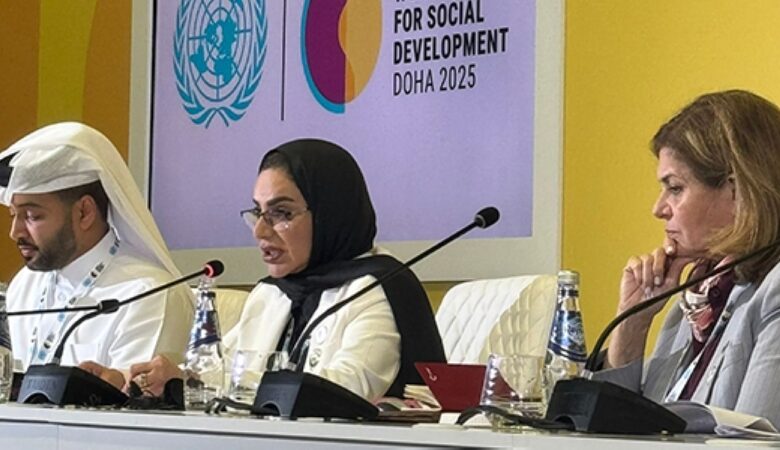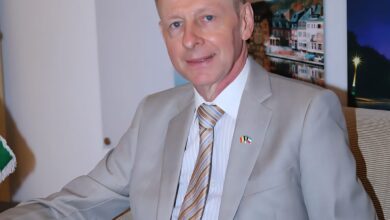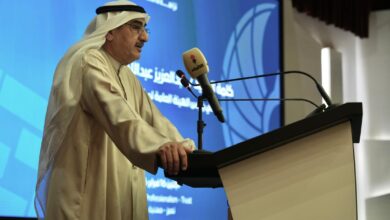‘Kuwait adopts national strategy to integrate persons with disabilities into development plans’
. . . reflects Kuwait’s firm commitment to human rights principles and inclusive development.

Minister of Social Affairs, Family and Childhood Affairs, Dr. Amthal Al-Huwailah, said on Tuesday that the State of Kuwait has adopted a comprehensive national strategy to integrate persons with disabilities into the country’s development plans.
She said this approach reflects Kuwait’s firm commitment to human rights principles and inclusive development.
Speaking at a high-level side event titled “From Commitment to Capabilities: Accelerating the Implementation of the UN Strategy for Disability Inclusion in Public Institutions in the Middle East and North Africa Region,” held in Doha on the sidelines of the Second World Summit for Social Development, Dr. Al-Huwailah emphasized that the strategy seeks to ensure full inclusion and empowerment of persons with disabilities in all aspects of life. The event was organized by the Qatari Ministry of Social Development and Family.
Al-Huwaileh explained that the Public Authority for Disability Affairs has been entrusted with implementing the national strategy through four main pillars — care, empowerment, legislative support, and community awareness. The initiative is part of Kuwait’s Vision 2035 development plan under the pillar of Creative Human Capital, and is being implemented in collaboration with various government agencies.
The minister highlighted several key achievements that reflect Kuwait’s progress in promoting accessibility and removing barriers. Among them is the approval of the Kuwaiti Building Code in 2024, which mandates universal design standards to ensure ease of access to public facilities and buildings.
In addition, Kuwait has developed a National Digital Accessibility Framework to align with international standards for online accessibility, enabling an inclusive digital environment. Work is underway to further enhance this framework in cooperation with the Gulf Cooperation Council’s branch of the World Wide Web Consortium.
On the employment front, Al-Huwailah noted that the executive plan for integrating persons with disabilities into the labor market has been approved and incorporated into the government’s 2024–2030 work program.
She also pointed to the success of the “Partners to Employ Them” campaign, launched in cooperation with civil society organizations, which trained 285 individuals — 82 percent of whom have since secured employment, with ongoing follow-up to ensure continued success.
Al-Huwailah added that a permanent national committee, chaired by her, has been established to oversee the implementation of Kuwait’s commitments to the rights of persons with disabilities. The committee brings together senior representatives from relevant ministries and government entities to ensure that disability-related issues remain a top national priority.
Despite the progress achieved, the minister acknowledged that the Middle East and North Africa region continues to face challenges, including weak enforcement of national laws, limited access to essential services, and a shortage of accurate data needed for effective planning.
She stressed that accelerating the implementation of the UN Disability Inclusion Strategy requires political will, institutional accountability, capacity building, and stronger partnerships — calling it “not an option, but a humanitarian and developmental necessity.”
In her concluding remarks, Dr. Al-Huwailah thanked the Qatari Ministry of Social Development and Family for hosting the event, expressing hope that its outcomes would help advance regional and international cooperation to move the UN inclusion strategy from planning to tangible impact, ensuring equality and justice for all.
At the same event, Qatari Minister of Social Development and Family, Buthaina Al-Nuaimi, reviewed Qatar’s legislative and strategic efforts to promote disability inclusion, grounded in the country’s constitution and Qatar National Vision 2030.
Jordanian Minister of Social Development, Wafaa Bani Mustafa, speaking on behalf of Prince Mired bin Raad, reaffirmed Jordan’s commitment to the Convention on the Rights of Persons with Disabilities.
Syrian Minister of Social Affairs and Labor, Hind Qabawat, also underscored the importance of inclusive public services despite the challenging circumstances in her country, highlighting Syria’s ongoing efforts to make government services more equitable and accessible.












